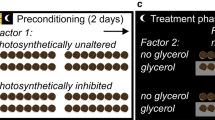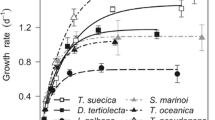Abstract:
Whenever actively photosynthesizing cells are exposed to conditions where carbon fluxes exceed intakes of other essential-nutrients required for formation of new biomass, cell division is arrested, and the excess carbon is stored, excreted or directed to secondary functions. The extent of this uncoupling and its' implications in aquatic systems are discussed. We focus on three examples: the cellular level of free living phytoplankton, the ecosystem level in the microbial food web, and the highly specialized level of species interactions in the symbiotic association between zooxanthellae and corals. These examples highlight the adaptive significance of uncoupling between photosynthesis and growth in aquatic systems. Moreover, we underscore the fact that in many real-world situations, net primary productivity cannot be equated to population growth.¶Roles of the "excess" carbon include photoprotective pigments and buoyancy regulating ballast. The excreted carbon compounds may protect cells or cell masses from desiccation, and fuel the microbial loop. The microbial loop increases overall nutrient extraction efficiency compared to that of which phytoplankton alone are capable.¶The zooxanthellae-coelenterate symbiosis drives the nutrient and energy fluxes supporting coral reef life in the nutrient-poor tropical seas. In those mutualistic associations, since photosynthesis is normally uncoupled from cell growth, the algae excrete most of their photosynthate and that supports the metabolic activities of the host.
Similar content being viewed by others
Author information
Authors and Affiliations
Additional information
Received 14 November 2000; revised manuscript accepted 11 December 2000.
Rights and permissions
About this article
Cite this article
Dubinsky, Z., Berman-Frank, I. Uncoupling primary production from population growth in photosynthesizing organisms in aquatic ecosystems. Aquat. sci. 63, 4–17 (2001). https://doi.org/10.1007/PL00001343
Issue Date:
DOI: https://doi.org/10.1007/PL00001343




